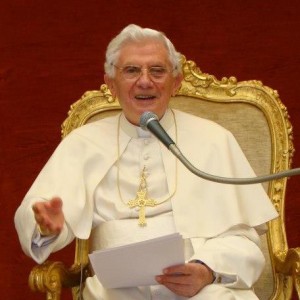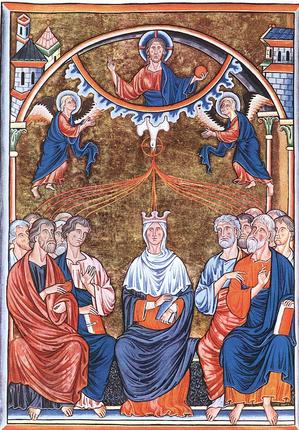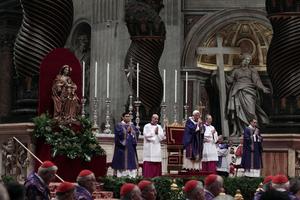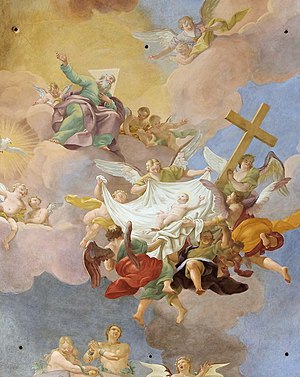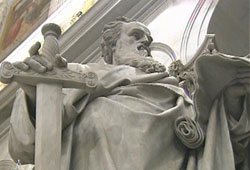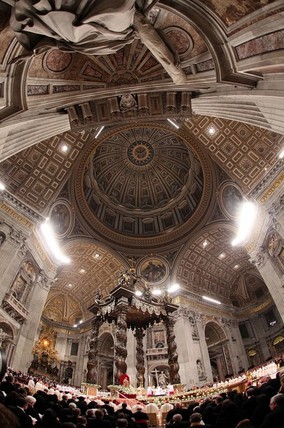For me, one of the great things is that Pope emeritus Benedict is still very engaged spiritually and intellectually in the life of the Church. It comes, I firmly believe, from his attraction to the spiritual life and the life of the intellect. When he retired from the petrine ministry he had indicated that he would not be too visible to the Church. He has, on occasion, been to Mass in the Basilica of St Peter and visited with others. Now, his has given the following interview gives good perspective for us on belief and discipleship.
In a recently published interview on issues of justification and faith, Benedict XVI has addressed issues of mercy and our need for forgiveness, salvation through the cross, the necessity of baptism, and the importance of sharing in Christ’s redeeming love.
The discussion with Fr. Jacques Servais, SJ, took place ahead of an October, 2015 conference in Rome studying the doctrine of justification by faith.
Benedict’s answers, originally in German, were read aloud as a text at the conference by the Prefect of the Pontifical Household, Archbishop Georg Gänswein.
They were later published as the introduction to a book in Italian on the conference texts and conclusions, titled “Through Faith: Doctrine of Justification and Experience of God in the Preaching of the Church and the Spiritual Exercises,” by Fr. Daniel Libanori, SJ.
The emeritus Pope began by noting that faith has both a personal and a communal nature, saying that “the encounter with God means also, at the same time, that I myself become open, torn from my closed solitude and received into the living community of the Church.”
He emphasized that both faith and the Church come from God, and are neither self-generating nor man-made.
“The Church must introduce the individual Christian into an encounter with Jesus Christ and bring Christians into His presence in the sacrament,” Benedict remarked.
He then focused on modern man’s tendency to ignore any personal sin and need for justification, and to focus instead on the suffering in the world, believing that God has to justify himself for this suffering.
“However, in my opinion, there continues to exist, in another way, the perception that we are in need of grace and forgiveness,” he said, pointing to the recent emphasis on mercy in the pontificates of both St. John Paul II and Pope Francis.
Pope Francis’ “pastoral practice is expressed in the fact that he continually speaks to us of God’s mercy,” he said. “It is mercy that moves us toward God, while justice frightens us before Him.”
“In my view, this makes clear that, under a veneer of self-assuredness and self-righteousness, the man of today hides a deep knowledge of his wounds and his unworthiness before God. He is waiting for mercy.”
Benedict suggested that the popularity of the parable of the Good Samaritan expresses this underlying desire for God and his mercy, adding that “it seems to me that in the theme of divine mercy is expressed in a new way what is means by justification by faith.”
He discussed how an old understanding of the Cross, articulated by St. Anselm, is difficult for modern man to relate to because of its focus on justice and its apparent juxtaposition of the Father and the Son.
The emeritus Pope reflected that God “simply cannot leave ‘as is’ the mass of evil that comes from the freedom that he himself has granted. Only He, coming to share in the world’s suffering, can redeem the world.”
In the Cross, he said, one perceives “what God’s mercy means, what the participation of God in man’s suffering means. It is not a matter of a cruel justice, not a matter of the Father’s fanaticism, but rather of the truth and the reality of creation: the true intimate overcoming of evil that ultimately can be realized only in the suffering of love.”
The discussion then turned to the missionary impulse, which was once informed by the conviction that all who died unbaptized would certainly go to hell.
Benedict noted, “there is no doubt that on this point we are faced with a profound evolution of dogma” and that since the 1950s “the understanding that God cannot let go to perdition all the unbaptized … has been fully affirmed.”
He noted that the great missionaries of the 1500s were compelled by their belief in the absolute necessity of baptism for salvation, and that the changing understanding of this necessity led to “a deep double crisis”: a loss of motivation for missionary work, and a loss of motivation for the faith itself.
The emeritus Pope addressed both the theory of the ‘anonymous Christian’ and indifferentism as inadequate solutions to the crises, and offered instead the idea that Christ’s loving suffering for the world is the solution, which must become our model.
He concluded by again emphasizing that the true solution to evil is the love of Christ: “The counterweight to the dominion of evil can consist in the first place only in the divine-human love of Jesus Christ that is always greater than any possible power of evil.”
“But it is necessary that we place ourselves inside this answer that God gives us through Jesus Christ,” he added, saying that receiving the sacrament of confession “certainly has an important role in this field.”
Receiving confession, he said, “means that we always allow ourselves to be molded and transformed by Christ and that we pass continuously from the side of him who destroys to the side of Him who saves.”
Below please find L’Osservatore Romano’s full English translation of the interview:
Servais: Your Holiness, the question posed this year as part of the study days promoted by the rectory of the Gesu (the residence for Jesuit seminarians in Rome) is that of justification by faith. The last volume of your collected works highlights your resolute affirmation: “The Christian faith is not an idea, but a life.” Commenting on the famous Pauline affirmation in Romans 3:28, you mentioned, in this regard, a twofold transcendence: “Faith is a gift to the believers communicated through the community, which for its part is the result of God’s gift” (“Glaube ist Gabe durch die Gemeinschaft; die sich selbst gegeben wird,” gs iv, 512). Could you explain what you meant by that statement, taking into account of course the fact that the aim of these days of study is to clarify the pastoral theology and vivify the spiritual experience of the faithful?
Benedict XVI: The question concerns what faith is and how one comes to believe. On the one hand, faith is a profoundly personal contact with God, which touches me in my innermost being and places me in front of the living God in absolute immediacy in such a way that I can speak with Him, love Him and enter into communion with Him. But at the same time this reality which is so fundamentally personal also has inseparably to do with the community. It is an essential part of faith that I be introduced into the “we” of the sons and daughters of God, into the pilgrim community of brothers and sisters. The encounter with God means also, at the same time, that I myself become open, torn from my closed solitude and received into the living community of the Church. That living community is also a mediator of my encounter with God, though that encounter touches my heart in an entirely personal way. Faith comes from hearing (fides ex auditu), St. Paul teaches us. Listening in turn always implies a partner.
Faith is not a product of reflection nor is it even an attempt to penetrate the depths of my own being. Both of these things may be present, but they remain insufficient without the “listening” through which God, from without, from a story He himself created, challenges me. In order for me to believe, I need witnesses who have met God and make Him accessible to me. In my article on baptism I spoke of the double transcendence of the community, in this way causing to emerge once again an important element: the faith community does not create itself. It is not an assembly of men who have some ideas in common and who decide to work for the spread of such ideas. Then everything would be based on its own decision and, in the final analysis, on the majority vote principle, which is, in the end it would be based on human opinion. A Church built in this way cannot be for me the guarantor of eternal life nor require decisions from me that make me suffer and are contrary to my desires. No, the Church is not self-made, she was created by God and she is continuously formed by him. This finds expression in the sacraments, above all in that of baptism: I enter into the Church not by a bureaucratic act, but through the sacrament. And this is to say that I am welcomed into a community that did not originate in itself and is projected beyond itself. The ministry that aims to form the spiritual experience of the faithful must proceed from these fundamental givens.
It is necessary to abandon the idea of a Church which produces herself and to make clear that the Church becomes a community in the communion of the body of Christ. The Church must introduce the individual Christian into an encounter with Jesus Christ and bring Christians into His presence in the sacrament.
Servais: When you were Prefect of the Congregation for the Doctrine of the Faith, commenting on the Joint Declaration of the Catholic Church and the Lutheran World Federation on the Doctrine of Justification of Oct. 31, 1999, you pointed out a difference of mentality in relation to Luther and the question of salvation and blessedness as he had posed it. The religious experience of Luther was dominated by terror before the wrath of God, a feeling quite alien to modern men, who sense rather the absence of God (see your article in Communio, 2000, 430). For these, the problem is not so much how to obtain eternal life, but rather how to ensure, in the precarious conditions of our world, a certain balance of fully human life. Can the teaching of St. Paul of justification by faith, in this new context, reach the “religious” experience or at least the “elementary” experience of our contemporaries?
Benedict XVI: First of all, I want to emphasize once again what I wrote in Communio (2000) on the issue of justification. For the man of today, compared to those of the time of Luther and to those holding the classical perspective of the Christian faith, things are in a certain sense inverted, or rather, is no longer man who believes he needs justification before God, but rather he is of the opinion that God is obliged to justify himself because of all the horrible things in the world and in the face of the misery of being human, all of which ultimately depend on Him. In this regard, I find it significant that a Catholic theologian may profess even in a direct and formal this inverted position: that Christ did not suffer for the sins of men, but rather, as it were, had “canceled the guilt of God.” Even if most Christians today would not share such a drastic reversal of our faith, we could say that all of this reveals an underlying trend of our times. When Johann Baptist Metz argues that theology today must be “sensitive to theodicy” (German: theodizee empfindlich), this highlights the same problem in a positive way. Even rescinding from such a radical contestation of the Church’s vision of the relationship between God and man, the man of today has in a very general way the sense that God cannot let most of humanity be damned. In this sense, the concern for the personal salvation of souls typical of past times has for the most part disappeared.
However, in my opinion, there continues to exist, in another way, the perception that we are in need of grace and forgiveness. For me it is a “sign of the times” the fact that the idea of the mercy of God should become more and more central and dominant – starting from Sister Faustina, whose visions in various ways reflect deeply the image of God held by the men of today and their desire for the divine goodness. Pope John Paul II was deeply impregnated by this impulse, even if this did not always emerge explicitly. But it is certainly not by chance that his last book, published just before his death, speaks of God’s mercy. Starting from the experiences which, from the earliest years of life, exposed him to all of the cruel acts men can perform, he affirms that mercy is the only true and ultimate effective reaction against the power of evil.
Only where there is mercy does cruelty end, only with mercy do evil and violence end. Pope Francis is totally in agreement with this line. His pastoral practice is expressed in the fact that he continually speaks to us of God’s mercy. It is mercy that moves us toward God, while justice frightens us before Him. In my view, this makes clear that, under a veneer of self-assuredness and self-righteousness, the man of today hides a deep knowledge of his wounds and his unworthiness before God. He is waiting for mercy.
It is certainly no coincidence that the parable of the Good Samaritan is particularly attractive to contemporary man. And not just because that parable strongly emphasizes the social dimension of Christian existence, nor only because in it the Samaritan, the man not religious, in comparison with the representatives of religion seems, so to speak, as one who acts really so in conformity with God, while the official representatives of religion seem, as it were, immune to God. This clearly pleases modern man. But it seems just as important to me, nevertheless, that men in their intimate consciences expect the Samaritan will come to their aid; that he will bend down over them, pour oil on their wounds, care for them and take them to safety. In the final analysis, they know that they need God’s mercy and his tenderness. In the hardness of the technologized world in which feelings no longer count for anything, the expectation however increases of a saving love that is freely given. It seems to me that in the theme of divine mercy is expressed in a new way what is means by justification by faith. Starting from the mercy of God, which everyone is looking for, it is possible even today to interpret anew the fundamental nucleus of the doctrine of justification and have it appear again in all its relevance.
When Anselm says that Christ had to die on the cross to repair the infinite offense that had been made to God, and in this way to restore the shattered order, he uses a language which is difficult for modern man to accept (cfr. Gs 215.ss iv). Expressing oneself in this way, one risks likely to project onto God an image of a God of wrath, relentless toward the sin of man, with feelings of violence and aggression comparable with what we can experience ourselves. How is it possible to speak of God’s justice without potentially undermining the certainty, deeply established among the faithful, that the God of the Christians is a God “rich in mercy” (Ephesians 2:4)? The conceptuality of St. Anselm has now become for us incomprehensible. It is our job to try again to understand the truth that lies behind this mode of expression. For my part I offer three points of view on this point:
a) the contrast between the Father, who insists in an absolute way on justice, and the Son who obeys the Father and, obedient, accepts the cruel demands of justice, is not only incomprehensible today, but, from the point of view of Trinitarian theology, is in itself all wrong. The Father and the Son are one and therefore their will is intrinsically one. When the Son in the Garden of Olives struggles with the will of the Father, it is not a matter of accepting for himself a cruel disposition of God, but rather of attracting humanity into the very will of God. We will have to come back again, later, to the relationship of the two wills of the Father and of the Son.
b) So why would the cross and the atonement? Somehow today, in the contortions of modern thought we mentioned above, the answer to these questions can be formulated in a new way. Let’s place ourselves in front of the incredible amount of evil, violence, falsehood, hatred, cruelty and arrogance that infect and destroy the whole world. This mass of evil cannot simply be declared non-existent, not even by God. It must be cleansed, reworked and overcome. Ancient Israel was convinced that the daily sacrifice for sins and above all the great liturgy of the Day of Atonement (Yom-Kippur) were necessary as a counterweight to the mass of evil in the world and that only through such rebalancing the world could, as it were, remain bearable. Once the sacrifices in the temple disappeared, it had to be asked what could be opposed to the higher powers of evil, how to find somehow a counterweight. The Christians knew that the temple destroyed was replaced by the resurrected body of the crucified Lord and in his radical and incommensurable love was created a counterweight to the immeasurable presence of evil. Indeed, they knew that the offers presented up until then could only be conceived of as a gesture of longing for a genuine counterweight. They also knew that in front of the excessive power of evil only an infinite love was enough, only an infinite atonement. They knew that the crucified and risen Christ is a power that can counter the power of evil and save the world. And on this basis they could even understand the meaning of their own sufferings as inserted into the suffering love of Christ and included as part of the redemptive power of such love. Above I quoted the theologian for whom God had to suffer for his sins in regard to the world. Now, due to this reversal of perspective, the following truths emerge: God simply cannot leave “as is” the mass of evil that comes from the freedom that he himself has granted. Only He, coming to share in the world’s suffering, can redeem the world.
c) On this basis, the relationship between the Father and the Son becomes more comprehensible. I will reproduce here on this subject a passage from the book by Henri de Lubac on Origen which I feel is very clear: “The Redeemer came into the world out of compassion for mankind. He took upon himself our passions even before being crucified, indeed even before descending to assume our flesh: if he had not experienced them beforehand, he would not have come to partake of our human life. But what was this suffering that he endured in advance for us? It was the passion of love. But the Father himself, the God of the universe, he who is overflowing with long-suffering, patience, mercy and compassion, does he also not suffer in a certain sense? ‘The Lord your God, in fact, has taken upon himself your ways as the one who takes upon himself his son’ (Deuteronomy 1, 31). God thus takes upon himself our customs as the Son of God took upon himself our sufferings. The Father himself is not without passion! If He is invoked, then He knows mercy and compassion. He perceives a suffering of love (Homilies on Ezekiel 6:6).”
In some parts of Germany there was a very moving devotion that contemplated the Not Gottes (“poverty of God”). For my part, that makes pass before my eyes an impressive image representing the suffering Father, who, as Father, shares inwardly the sufferings of the Son. And also the image of the “throne of grace” is part of this devotion: the Father supports the cross and the crucified, bends lovingly over him and the two are, as it were, together on the cross. So in a grand and pure way, one perceives there what God’s mercy means, what the participation of God in man’s suffering means. It is not a matter of a cruel justice, not a matter of the Father’s fanaticism, but rather of the truth and the reality of creation: the true intimate overcoming of evil that ultimately can be realized only in the suffering of love.
Servais: In the Spiritual Exercises, Ignatius of Loyola does not use the Old Testament images of revenge, as opposed to Paul (cfr. 2 Thessalonians 1: 5-9); nevertheless he invites us to contemplate how men, until the Incarnation, “descended into hell” (Spiritual Exercises n. 102; see. ds iv, 376) and to consider the example of the “countless others who ended up there for far fewer sins than I have I committed” (Spiritual Exercises, n. 52). It is in this spirit that St. Francis Xavier lived his pastoral work, convinced he had to try to save from the terrible fate of eternal damnation as many “infidels” as possible. The teaching, formalized in the Council of Trent, in the passage with regard to the judgment of the good and the evil, later radicalized by the Jansenists, was taken up in a much more restrained way in the Catechism of the Catholic Church (cfr. § 5 633, 1037). Can it be said that on this point, in recent decades, there has been a kind of “development of dogma” that the Catechism should definitely take into account?
Benedict XVI: There is no doubt that on this point we are faced with a profound evolution of dogma. While the fathers and theologians of the Middle Ages could still be of the opinion that, essentially, the whole human race had become Catholic and that paganism existed now only on the margins, the discovery of the New World at the beginning of the modern era radically changed perspectives. In the second half of the last century it has been fully affirmed the understanding that God cannot let go to perdition all the unbaptized and that even a purely natural happiness for them does not represent a real answer to the question of human existence. If it is true that the great missionaries of the 16th century were still convinced that those who are not baptized are forever lost – and this explains their missionary commitment – in the Catholic Church after the Second Vatican Council that conviction was finally abandoned.
From this came a deep double crisis. On the one hand this seems to remove any motivation for a future missionary commitment. Why should one try to convince the people to accept the Christian faith when they can be saved even without it? But also for Christians an issue emerged: the obligatory nature of the faith and its way of life began to seem uncertain and problematic. If there are those who can save themselves in other ways, it is not clear, in the final analysis, why the Christian himself is bound by the requirements of the Christian faith and its morals. If faith and salvation are no longer interdependent, faith itself becomes unmotivated.
Lately several attempts have been formulated in order to reconcile the universal necessity of the Christian faith with the opportunity to save oneself without it. I will mention here two: first, the well-known thesis of the anonymous Christians of Karl Rahner. He sustains that the basic, essential act at the basis of Christian existence, decisive for salvation, in the transcendental structure of our consciousness, consists in the opening to the entirely Other, toward unity with God. The Christian faith would in this view cause to rise to consciousness what is structural in man as such. So when a man accepts himself in his essential being, he fulfills the essence of being a Christian without knowing what it is in a conceptual way. The Christian, therefore, coincides with the human and, in this sense, every man who accepts himself is a Christian even if he does not know it. It is true that this theory is fascinating, but it reduces Christianity itself to a pure conscious presentation of what a human being is in himself and therefore overlooks the drama of change and renewal that is central to Christianity. Even less acceptable is the solution proposed by the pluralistic theories of religion, for which all religions, each in their own way, would be ways of salvation and in this sense, in their effects must be considered equivalent. The critique of religion of the kind exercised in the Old Testament, in the New Testament and in the early Church is essentially more realistic, more concrete and true in its examination of the various religions. Such a simplistic reception is not proportional to the magnitude of the issue.
Let us recall, lastly, above all Henri de Lubac and with him some other theologians who have reflected on the concept of vicarious substitution. For them the “pro-existence” (“being for”) of Christ would be an expression of the fundamental figure of the Christian life and of the Church as such. It is possible to explain this “being for” in a somewhat more abstract way. It is important to mankind that there is truth in it, this is believed and practiced. That one suffers for it. That one loves. These realities penetrate with their light into the world as such and support it. I think that in this present situation it becomes for us ever more clear what the Lord said to Abraham, that is, that 10 righteous would have been sufficient to save a city, but that it destroys itself if such a small number is not reached. It is clear that we need to further reflect on the whole question.
Servais: In the eyes of many secular humanists, marked by the atheism of the 19th and 20th centuries, as you have noted, it is rather God – if he exists – not man who should be held accountable for injustice, the suffering of the innocent, the cynicism of power we are witnessing, powerless, in the world and in world history (see. Spe Salvi, n. 42) … In your book Jesus of Nazareth, you echo what for them – and for us – is a scandal: “The reality of injustice, of evil, cannot be simply ignored, simply put aside. It absolutely must be overcome and conquered. Only in this way is there really mercy” (Jesus of Nazareth, ii 153, quoting 2 Timothy 2:13). Is the sacrament of confession, one of the places where evil can be “repaired?” If so, how?
Benedict XVI: I have already tried to expose as a whole the main points related to this issue in my answer to your third question. The counterweight to the dominion of evil can consist in the first place only in the divine-human love of Jesus Christ that is always greater than any possible power of evil. But it is necessary that we place ourselves inside this answer that God gives us through Jesus Christ. Even if the individual is responsible for a fragment of evil, and therefore is an accomplice of evil’s power, together with Christ he can nevertheless “complete what is lacking in his sufferings” (cfr. Colossians 1, 24). The sacrament of penance certainly has an important role in this field. It means that we always allow ourselves to be molded and transformed by Christ and that we pass continuously from the side of him who destroys to the side of Him who saves.
